HCA Vanadzor Observed Local Government Elections in Ukraine on October 25
16:08, October 31, 2015 | News, Own news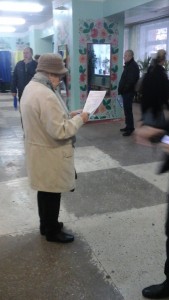 On October 22-27, 2015, Anush Hambaryan and Narine Yeganyan, representatives of HCA Vanadzor in Ukraine took part in the practices held by the European Exchange and the International Society for Fair Elections and Democracy (ISFED) under the European Platform for Democratic Elections (EPDE) and on October 25 observed the local government elections in a number of electoral districts. During the visit, the Organization’s staff participated in discussions and press conferences, with the representatives of local organizations outlining the domestic policy issues of Ukraine, as well as the peculiarities and shortcomings of elections and legislative regulations in such a state of affairs. At the discussions, the speakers specifically highlighted the issue of internally displaced persons being deprived of the opportunity to exercise their electoral rights. Thus, around 1.5 million people were not registered at their current places of residence and therefore could not enjoy the opportunity to take part in the formation of authorities in their communities. Interestingly, the place of residence requirement does not apply to candidates; every citizen can file their candidacy in any community, regardless of their place of residence and place of registration. According to the representatives of local organizations, another problematic issue was the Law on Local Elections dated July of 2015.
On October 22-27, 2015, Anush Hambaryan and Narine Yeganyan, representatives of HCA Vanadzor in Ukraine took part in the practices held by the European Exchange and the International Society for Fair Elections and Democracy (ISFED) under the European Platform for Democratic Elections (EPDE) and on October 25 observed the local government elections in a number of electoral districts. During the visit, the Organization’s staff participated in discussions and press conferences, with the representatives of local organizations outlining the domestic policy issues of Ukraine, as well as the peculiarities and shortcomings of elections and legislative regulations in such a state of affairs. At the discussions, the speakers specifically highlighted the issue of internally displaced persons being deprived of the opportunity to exercise their electoral rights. Thus, around 1.5 million people were not registered at their current places of residence and therefore could not enjoy the opportunity to take part in the formation of authorities in their communities. Interestingly, the place of residence requirement does not apply to candidates; every citizen can file their candidacy in any community, regardless of their place of residence and place of registration. According to the representatives of local organizations, another problematic issue was the Law on Local Elections dated July of 2015. 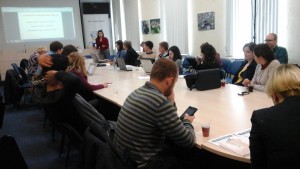 The Law stipulates an electoral system of 3-types of local government elections, which is quite difficult to understand for the voters, particularly in terms of the efficiency of electoral processes. The electoral system has the structure below: 1. village and settlement councils (elected through majority voting system) as well as head of villages, settlements and towns with a population below 90,000 are elected through direct voting. Thus, the candidate who gains the most number of votes wins the election; 2. mayors of towns with a population over 90,000 are elected by a simple majority (50% + 1). If none of the candidates receives the sufficient number of votes, the candidates enter a second round of elections; and 3. the county, region, city and district councils are elected through proportional voting system. Each territorial unit where elections are held is divided into equal sub-regions in accordance with the number of council members. The political parties submit lists of candidates for the entire multi-mandate territorial unit. The list of each party has a leading candidate not attached to any sub-region and considered elected if the party wins at least one seat, while the other candidates may be attached to one, several or all the sub-regions. Each sub-region has a separate ballot paper with the names of the political parties, leading candidates of the parties and the name of the candidate attached to that particular sub-region, if any.
The Law stipulates an electoral system of 3-types of local government elections, which is quite difficult to understand for the voters, particularly in terms of the efficiency of electoral processes. The electoral system has the structure below: 1. village and settlement councils (elected through majority voting system) as well as head of villages, settlements and towns with a population below 90,000 are elected through direct voting. Thus, the candidate who gains the most number of votes wins the election; 2. mayors of towns with a population over 90,000 are elected by a simple majority (50% + 1). If none of the candidates receives the sufficient number of votes, the candidates enter a second round of elections; and 3. the county, region, city and district councils are elected through proportional voting system. Each territorial unit where elections are held is divided into equal sub-regions in accordance with the number of council members. The political parties submit lists of candidates for the entire multi-mandate territorial unit. The list of each party has a leading candidate not attached to any sub-region and considered elected if the party wins at least one seat, while the other candidates may be attached to one, several or all the sub-regions. Each sub-region has a separate ballot paper with the names of the political parties, leading candidates of the parties and the name of the candidate attached to that particular sub-region, if any.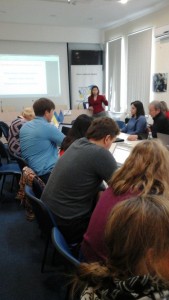 Hence, while these lists are presented as ‘open lists’, voters elect by a single ballot a party, its leading candidate and the candidate attached to a particular sub-region, if any. Within the council, the seats are distributed among the parties who overcome the 5% threshold. As for the lists of such parties, the seats are held by the leading candidate, regardless of the number of votes, and the candidates who received most of the votes. At the discussion, it was also noted that during the election campaign, the so-called “Asian Competition” can often be seen in Ukraine as the competition develops into personal animosity. During the campaign, the Organization’s representatives witnessed an incident as a citizen obstructed the representative of a party in the campaigning by throwing down the promotional materials in his hands and shaking down the promotional banners. Also, they emphasized that in their election campaigns, the parties mostly targeted issues of national importance, such as gas prices and pension reforms rather than local issues. The discussion participants also touched upon the issues of transparent use of funds by political parties. The law obliges the individual candidates to be elected through majority system to present the campaign expenses and donations to the election commission of the relevant electoral district, which is obliged to publish them. However, the law does not specify the extent and procedure for such information to be made public, which may create distrust in terms of transparency.
Hence, while these lists are presented as ‘open lists’, voters elect by a single ballot a party, its leading candidate and the candidate attached to a particular sub-region, if any. Within the council, the seats are distributed among the parties who overcome the 5% threshold. As for the lists of such parties, the seats are held by the leading candidate, regardless of the number of votes, and the candidates who received most of the votes. At the discussion, it was also noted that during the election campaign, the so-called “Asian Competition” can often be seen in Ukraine as the competition develops into personal animosity. During the campaign, the Organization’s representatives witnessed an incident as a citizen obstructed the representative of a party in the campaigning by throwing down the promotional materials in his hands and shaking down the promotional banners. Also, they emphasized that in their election campaigns, the parties mostly targeted issues of national importance, such as gas prices and pension reforms rather than local issues. The discussion participants also touched upon the issues of transparent use of funds by political parties. The law obliges the individual candidates to be elected through majority system to present the campaign expenses and donations to the election commission of the relevant electoral district, which is obliged to publish them. However, the law does not specify the extent and procedure for such information to be made public, which may create distrust in terms of transparency.  On the election day, the representatives of HCA Vanadzor visited over a dozen polling stations in Kiev region to observe the election. They recorded organizational shortcomings, such as delayed start of voting, insufficient number of ballot boxes and lack of seals thereon, low level of secrecy of voting, availability of campaign materials near the polling stations, inaccessibility of polling stations for persons with disabilities, etc. There were some significant flaws in the voters’ register, which contained data of persons not registered at the polling district in question, and vice versa, contained no data of some persons aged over 18, who were actually eligible to vote. The Organization’s representatives also noticed that the committee members were quite inexperienced in fulfilling their functions. However, it should be also noted that the observers did not think that the violations identified might have had a big impact on the election results. By decree 155210 dated 2015.10.25, the Ukrainian parliament decided not to hold elections in the area of Ukraine occupied by Russian and a number of communities of territories controlled by the separatists, namely Donetsk and Lugansk. Also, due to sabotage by the members of the election commission, the elections were as well annulled in Mariupol, Krasnoarmeysk and Svatovo settlements. Another noteworthy fact concerns the large number of the observers and proxies supervising the legality of the election at the polling stations. In some polling stations, up to 80 observers and proxies were registered. The number of volunteer short-term observers from the 2 largest local organizations observing the elections in Ukraine, namely OPORA Civil Network and the Committee of Voters of Ukraine (CVU) totaled 7,000. It should be noted that while Russian Federation did not observe the elections on state level, representatives of the Russian civil society were involved in the international observation missions, including the European Platform for Democratic Elections. According to the above Law on Local Elections, in case of recording violation of any provision of the Law, the observers (in RA: proxies) accredited by both local NGOs, and candidates and political parties may file a complaint with relevant election commission or a court of law.
On the election day, the representatives of HCA Vanadzor visited over a dozen polling stations in Kiev region to observe the election. They recorded organizational shortcomings, such as delayed start of voting, insufficient number of ballot boxes and lack of seals thereon, low level of secrecy of voting, availability of campaign materials near the polling stations, inaccessibility of polling stations for persons with disabilities, etc. There were some significant flaws in the voters’ register, which contained data of persons not registered at the polling district in question, and vice versa, contained no data of some persons aged over 18, who were actually eligible to vote. The Organization’s representatives also noticed that the committee members were quite inexperienced in fulfilling their functions. However, it should be also noted that the observers did not think that the violations identified might have had a big impact on the election results. By decree 155210 dated 2015.10.25, the Ukrainian parliament decided not to hold elections in the area of Ukraine occupied by Russian and a number of communities of territories controlled by the separatists, namely Donetsk and Lugansk. Also, due to sabotage by the members of the election commission, the elections were as well annulled in Mariupol, Krasnoarmeysk and Svatovo settlements. Another noteworthy fact concerns the large number of the observers and proxies supervising the legality of the election at the polling stations. In some polling stations, up to 80 observers and proxies were registered. The number of volunteer short-term observers from the 2 largest local organizations observing the elections in Ukraine, namely OPORA Civil Network and the Committee of Voters of Ukraine (CVU) totaled 7,000. It should be noted that while Russian Federation did not observe the elections on state level, representatives of the Russian civil society were involved in the international observation missions, including the European Platform for Democratic Elections. According to the above Law on Local Elections, in case of recording violation of any provision of the Law, the observers (in RA: proxies) accredited by both local NGOs, and candidates and political parties may file a complaint with relevant election commission or a court of law. 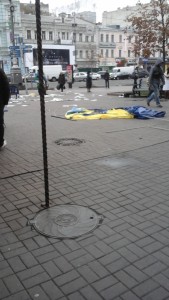 Such complaints should be signed by them and at least 2 voters confirming such violation.
Such complaints should be signed by them and at least 2 voters confirming such violation. 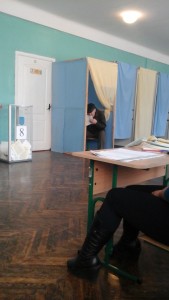 In Armenia, proxies may appeal the decisions, actions and inactions of the Election Commission members and election results if they are present at the count of votes. Also, they may file complaints on violations of their rights. As for NGO observers, they are entitled only to file complaints on the violation of their right. It is noteworthy that these elections were the first local government elections after the change of government in Ukraine as the power passed into the hands of the opposition, but the former local authorities still remained in power.
In Armenia, proxies may appeal the decisions, actions and inactions of the Election Commission members and election results if they are present at the count of votes. Also, they may file complaints on violations of their rights. As for NGO observers, they are entitled only to file complaints on the violation of their right. It is noteworthy that these elections were the first local government elections after the change of government in Ukraine as the power passed into the hands of the opposition, but the former local authorities still remained in power.
